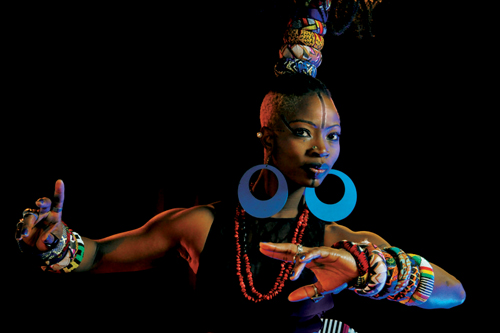Dobet Gnahoré is a singer, dancer and percussion’s from Africa’s Ivory Coast. She not only possesses a incredible voice but she also has a commanding presence on stage. Gnahoré inherited all the power of the bete traditions from her father Boni Gnahoré, a master percussionist who plays with the Abidjan-based Ki-Yi Mbock Company, directed by Werewere Liking.
It was within this Ivory Coast-based company that Dobet met French guitarist Colin Laroche de Feline, who went there to immerse himself in African melodies and rhythms, after being introduced to them by Toroma Sika in France.
Having spent some time in the well-known TchéTché dance company, Dobet decided with Colin (in 1999) to form a duo, Ano Neko, which means “Let’s create together” in Bete language. The duo toured widely in France (1999-2000) where they settled temporarily following the instability that unfortunately struck the Ivory Coast. They also worked together on different projects (the creation with Ba Cissoko of Le Cabaret Nomade and L’Entre Deux Monde).
When they returned to Abidjan in 2001, they took part in MASA Off (festival) where they were the center of attention and, while they were there, they recorded eight songs under the supervision of the late Marcellin Yac?, who was killed during the first day of rioting in the autumn of 2002. They then decided to return to France, at least until peace and stability reigned in their beautiful country once again.
In 2003, their artistic project refocused on Dobet Gnahoré and expanded when a backup vocalist and a percussionist joined them.
This was when Belgian management agency Contre Jour, which had taken Dobet’s destiny in hand, produced her first album titled Ano Neko, making the link with Dobet and Colin’s story. This CD comprises songs recorded in Abidjan and others recorded in Belgium during the summer of 2003. The album includes Manding melodies, Congolese rumba, Ivory Coast Ziglibiti, Cameroon Bikutsi, Ghanaian High-Life and Zulu choirs. Gnahore’s album is a mix of African folk traditions with modern sounds reminiscent of the work of Zap Mama and Sally Nyolo and features songs in French, Bete, Fon, Baule, Lingala and Malinke. The sanza, the balafon, the calabash and bongos were brought in to support the guitar, the vocal backup and Dobet’s warm and powerful voice.
In 2021, Cumbancha Records announced the release of an album titled “Couleur,” accompanied by a series of music videos.
In May 2024, Dobet Gnahoré announced the release her seventh studio album, Zouzou, on June 28th, 2024. This album mixess African rhythms with contemporary influences and meaningful lyrics. Inspired by the challenges African children face, Gnahoré dedicates this album to the youth shaping the continent’s future. Additionally, the album marks the inception of a new orphanage project in Ivory Coast, reflecting Gnahoré’s dedication to fostering positive change and opportunities for the next generation.
Zouzou, translating to “Angel” in French, exhibitss Gnahoré’s talent as a vocalist, dancer, percussionist, and songwriter, offering a vibrant tribute to African culture and identity. Recognized for her dynamic stage presence and emotionally resonant vocal style, Gnahoré has received numerous accolades, including a Grammy Award for Best Urban/Alternative Performance in 2010 for her collaboration with India.Arie.
Produced by Momo Wang, also known as Dr. Wang, “Zouzou” benefits from the expertise of one of Abidjan’s prominent beat makers, who has worked with internationally acclaimed artists such as Aya Nakamura and Ariel Sheney.
Discography:
Ano Neko (Contre-Jour, 2004)
Na Afriki (Contre-Jour/Cumbancha, 2007)
Djekpa La You (Contre-Jour, 2010)
Na Drê (Contre-Jour, 2014)
Miziki (Café de la Danse, 2018)
Couleur (Cumbancha Records, 2021)



Updated biography and biography